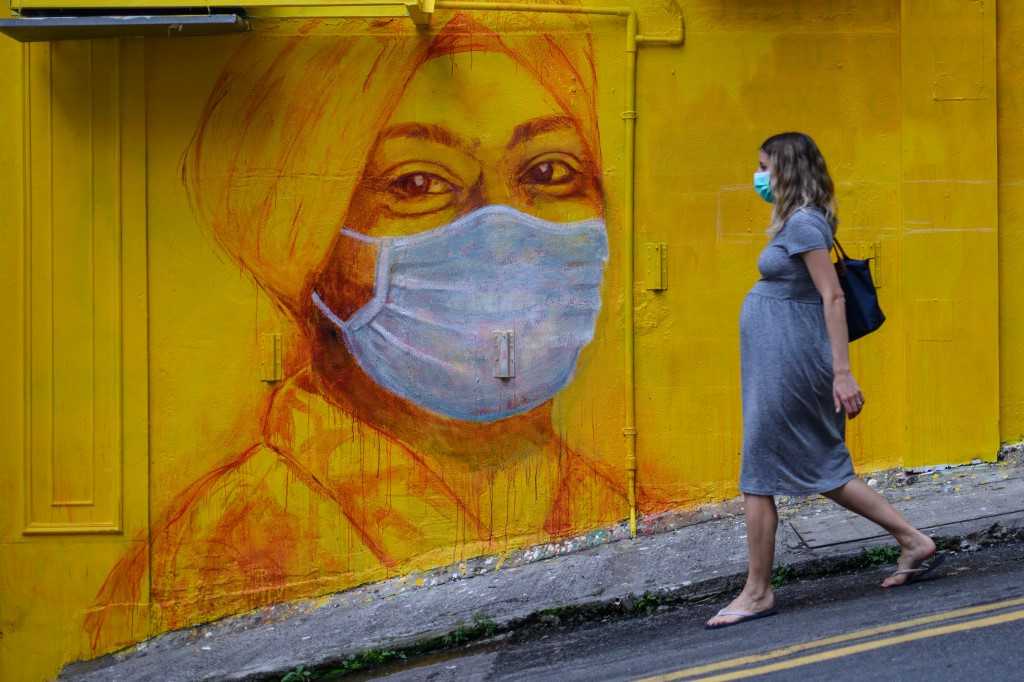Pandemic drives expectant moms in US to embrace home births
08 April, 2020

Like many pregnant ladies, Gina Conley is nervous. But there is far more to worry about nowadays, with a virulent outbreak overwhelming hospitals and convincing women that are pregnant to choose the relative safety of a home birth.
"I won't need to visit a hospital where there are potentially a whole lot of sick persons and staff which have been subjected to the coronavirus," says the 32-year-old from NEW YORK.
The pandemic has torn through one country after another, laying waste to economies, roiling public institutions and notching around 400,000 infections in the usa -- a lot more than 12,000 of these fatal.
As hospital wards become battlefields in the war from this looming threat, choosing where to give birth is a quandary many pregnant ladies did not expect to have to face.
Concern with infection, staff and drug shortages, and increasingly strict rules on visitors are leading a growing number of women to consider shunning hospitals.
But soon-to-be moms must weigh fears for his or her newborns and worries over their own health with the prohibitive cost of experiencing a baby in the home.
Conley, who is seven months pregnant, said she'll pay a lot more than $4,000 to cover the services associated with a home birth, the greatest of which is typically the midwife.
"It's definitely not cheap but getting the birth experience that we want, with much less anxiety -- we felt enjoy it was worth it," the fitness trainer told AFP.
Home births are believed "out of network" under many plans in the byzantine US medical health insurance ecosphere, and couples are rarely lucky enough to be fully covered.
'Not an option'
Ashley Esposito, a 35-year-old data specialist from the East Coast port city of Baltimore, expects to spend up to $8,000 up front.
"Paying all that chunk of money, especially given the finances, you know -- there are people from my husband's job who were let go," Esposito told AFP.
"Nothing is, like, completely guaranteed."
Esposito has added her name to a set of 1,300 people who've signed a petition urging health insurers in the state of Maryland to provide better coverage of home births.
Like many soon-to-be moms, she worries about new anti-infection rules adopted by some hospitals that limit the quantity of people who could be in the delivery room.
"That is our first healthy baby so my hubby not being there is not an option for me personally," said Esposito, who found in vitro fertilization after two miscarriages.
In NY, hospitals had barred husbands or partners from delivery rooms until Governor Andrew Cuomo stepped in last month and signed a decree stating no women had to give birth alone.
Jordan Perez, 30, will soon reach full term in Homer, Alaska, where she made a decision to have her baby in the home.
"I've always wanted to get a home birth but prior to the virus happened, my midwife team didn't offer home birth," said Perez, who sells cosmetic products.
"I think about a week ago, they said, 'OK, let's do it now. With the virus that's happening, we are able to make it work,'" she added.
With health services bracing for worse to can be found in a crisis of historic proportions, the American College of Obstetricians and Gynecologists says hospitals stay safe places to give birth.
Nevertheless, midwives are struggling to handle the sudden boom popular because of their expertise in home births.
Of roughly 12,000 certified nurse midwives and midwives in America, around 3,000 practice outside hospitals.
Zoom appointments
"We will often have between four and six [births] monthly... and today we are maxed out at eight per month, and we actually have 10 in July," said certified nurse midwife Mairi Breen Rothman.
Her practice -- M.A.M.A.S., just outside Washington -- has hired a third midwife, its schedule is booked solid through August, and it has had to turn away clients.
Midwives are having to change just how they work to be able to avoid the spread of the virus -- reducing house calls, seeing patients via online tools like Zoom and wearing face masks.
Rothman makes patients wait in their car instead of in the waiting room, and asks them to leave behind their personal possessions prior to going set for the examination.
"The customers come to the house plus they text us from their car. When the individual before them is fully gone, we tell them they can come in. They come to the entranceway via the separate entrance," she said.
Following the check-up, when the patient leaves, staff wipe down every surface that may have been touched, together with door knobs, light switches, clinical equipment etc.
"We clean the toilet. And we call another person to come in," Rothman says with a nervous laugh.
Esposito, who plans to provide birth while watching the main "Lord of the Rings" saga, said she'll take no risks once her child is born into a world which has changed almost overnight.
"I'm just likely to stay in my bubble for the most part," she said.
"I don't think we will have much interaction with persons apart from, like, Skype."
Source: www.thejakartapost.com
TAG(s):
